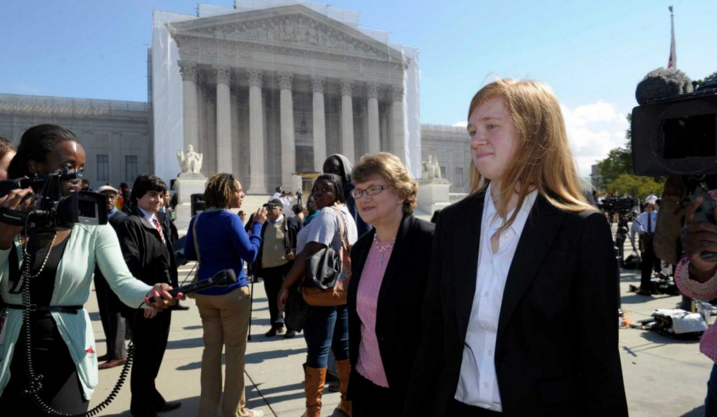
Abigail Fisher (right) is the plaintiff in the Fisher v. University of Texas case (Susan Walsh/Associated Press)
In a tight decision issued on Thursday, the United States Supreme Court reaffirmed the use of race in admissions at the University of Texas at Austin.
Earlier this year, the American Council on Education and 37 other higher education institutions - including Harvard, MIT and Tufts - signed an amicus brief, urging the Court to protect affirmative action in college admissions.
"We think it's a home run for the University of Texas, and a grand slam for higher education,” said Terry Hartle, ACE’s Senior Vice President.
Hartle says this decision marks the fourth time within a forty-year period that the Court upheld race-based admissions.
"The implications of this decision is something that campus officials - particularly general counsels - will be thinking about extensively over the next couple of weeks,” he said.
Earlier: Asian American Groups Target Ivy League Schools For Racial Discrimination
In a statement, U.S. Secretary of Education John B. King Jr. said he’s pleased with the decision.
“More than ever before, today’s students need to be prepared to succeed in a diverse, global workforce. Diversity benefits communities, schools and students from all backgrounds, and research has shown that more diverse organizations make better decisions with better results,” King wrote in the statement.
LISTEN: WGBH's Morning Edition host Bob Seay interviews WGBH's Legal Analyst and Northeastern School of Law Professor Daniel Medwed
In a separate statement, University of Texas at Austin President Gregory L. Fenves wrote he's “thrilled and gratified” by the ruling.
“The court has affirmed UT’s efforts to develop a diverse student body that brings with it educational benefits for all students. Our pursuit of excellence is grounded in the university’s public mission to provide the highest quality education for every student. Diversity is essential to carry out that mission," Fenves wrote.
The vote was tight - 4 to 3. Only seven justices participated in the decision, following the passing of Justice Antonin Scalia, whose seat remains vacant, and Justice Elena Kagan’s recusal due to her prior work on the case as United States Solicitor General.
Related: How One College Increased Diversity By Focusing On Class










